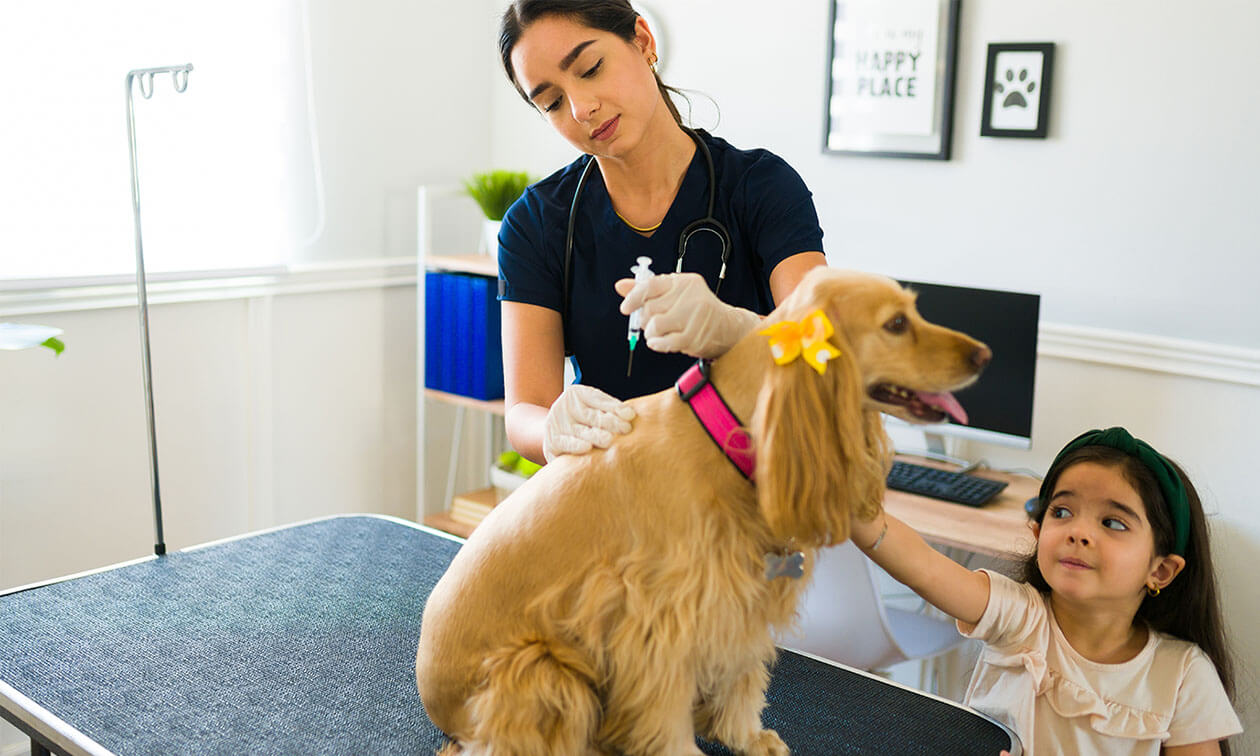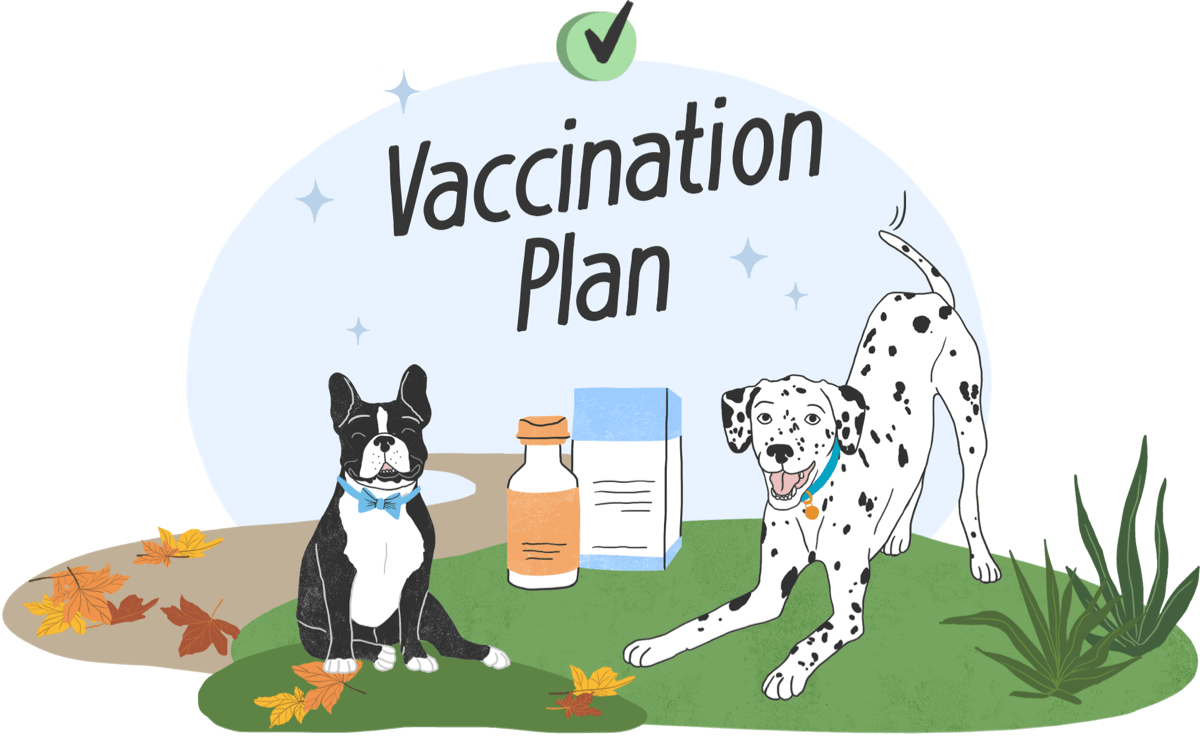As humans, we’re constantly getting information from many places and sources. Some of that information is factual, based on research, and provides essential knowledge to help pet owners make decisions, while other information is based on opinions. Lastly, there's information that's simply inaccurate or misleading. This can be confusing for pet owners when caring for their pets.
One area of pet care often surrounded by myths is pet vaccines. This article aims to provide the facts about pet vaccines and put to rest some of the common myths surrounding them.
Common Pet Vaccine Myths
- Vaccines make pets sick.
Vaccines have an excellent safety record. Their benefits outweigh the risks. vaccines are safer than ever, reflected in the fact that reaction rates have declined by about half over the last 15 years1. Vaccine manufacturers have worked hard to minimize adverse reactions while protecting pets from serious diseases.
While pets can have vaccine reactions, the rate is far less common than pet owners may realize. For cats, the adverse reaction rate within 30 days of the vaccine is only 0.52%2. Lethargy, lack of appetite, fever, and injection site inflammation were the most commonly reported adverse reactions. An adverse reaction was more likely to occur when multiple vaccines were given at one time.
For dogs, there are only 18.4 vaccine-associated adverse reactions for every 10,000 vaccines given1. These might include fever, lethargy, or allergic reactions like itchy rashes or anaphylaxis.
- Vaccines are not necessary for indoor-only pets.
In the United States, almost all states require rabies vaccines for dogs and cats, regardless of whether they are strictly indoor or not. Vaccines are recommended for cats, even if they're indoor-only, for several reasons.
- Escapes. Cats still have access to the outdoors if they escape or while traveling.
- Safety of other pets and people. Grooming and boarding facilities, airports, and hotels require core and non-core vaccines for both human and pet safety. Some viruses, such as rabies, are fatal to pets and humans. Other viruses are highly contagious, airborne spread, and can be very difficult to eliminate from the environment once present.
- Things we bring in with us. People can expose cats via indirect transmission, such as diseases and parasites on shoes, clothes, etc. carried into the home. Most dogs should have outdoor access. But even in those rare cases of indoor-only dogs, they can still be exposed to viruses in many ways.
Most dogs should have outdoor access. But even in those rare cases of indoor-only dogs, they can still be exposed to viruses in many ways.
- Things we bring in. People can bring viruses or bacteria into the home on shoes or clothes.
- Things other dogs bring in. Play dates inside with other dogs can put indoor-only dogs at risk.
- Airborne viruses. While some viruses are spread via direct contact, others are airborne transmission. If your dog is kept from direct contact with other dogs, they can still become infected.
- Requirements. If you want to adopt a rescue pet, most rescues require your current pets to be vaccinated.
- Safety of other pets and people. Grooming and boarding facilities, airlines, and hotels require vaccines to protect your dog, other dogs, and people. Some diseases that pets are vaccinated for can be zoonotic. This means it could spread from animals to people.
Even if you never plan to board your dog, emergencies happen. It is always better to plan ahead and protect your pet.
- Older pets don't need vaccines.
Pets who have been fully vaccinated throughout their lives have little risk of developing the infectious diseases they were vaccinated for. But "little" doesn't mean "no" risk.
Older pets are more prone to medical issues. This can weaken their immune system causing them to be more susceptible to other diseases, many of which they can be vaccinated against. Without vaccination, they are at greater risk of infection and if they also have underlying medical issues, the consequences can be serious. - Veterinarians recommend unnecessary vaccines.
Veterinarians take an oath that states they will use scientific knowledge to benefit society through the protection of animal health and to prevent and provide relief of animal suffering. They also vow to practice conscientiously, with dignity, and with medical ethics.
Veterinarians develop vaccine protocols based on current evidence-based guidelines and then tailor them to your individual pet's risk factors and lifestyle. - By skipping vaccines, pet owners can save money.
Vaccinating a perfectly healthy pet may seem like a waste of money, but vaccines help prevent illnesses that can be very costly to treat or, worse yet, can be fatal.
Treating a dog for parvovirus is estimated to cost between $1,000 and $3,0003. In addition to costing less ($30 to $40), vaccinating prevents your dog from discomfort and pain if they get parvo.
Providing a booster to your cat that is a carrier for feline viral rhinotracheitis helps prevent flare-ups of the virus. This decreases the chances of recurrent infection and shedding the virus, which can infect other cats. Depending on the severity of the infection and how sick your cat is, treatment can range from $100 to upwards of $2,0004. Whereas the vaccine costs, on average, $20 to $405.
Getting your pets vaccinated is very important and the benefits outweigh the risks. Work with your veterinarian to determine which vaccines your pet needs and ask them about concerns you have about them.
ZPC-02572
Banfield Pet Hospital Exchange. Vaccine-associated adverse events in dogs are far less common today. https://www.banfieldexchange.com/News/Vaccine-associated-adverse-events. Accessed April 2, 2023.
AAHA. Adverse Postvaccine Reactions. https://www.aaha.org/aaha-guidelines/2020-aahaaafp-feline-vaccination-guidelines/adverse-postvaccination-reactions/. Accessed April 2, 2023.
Emergency Vets USA. How to Treat Parvo in Dogs. https://emergencyvetsusa.com/how-to-treat-parvovirus-in-dogs/. Accessed April 2, 2023.
GreatPetCare.com. All About Feline Herpes. https://www.greatpetcare.com/cat-health/feline-herpes/. Accessed April 2, 2023.
MetLife. FVRCP Vaccine Costs: A Quick Guide for Pet Parents. https://www.metlifepetinsurance.com/blog/pet-planning/fvrcp-vaccine-cost-for-cats/. Accessed April 2, 2023.



